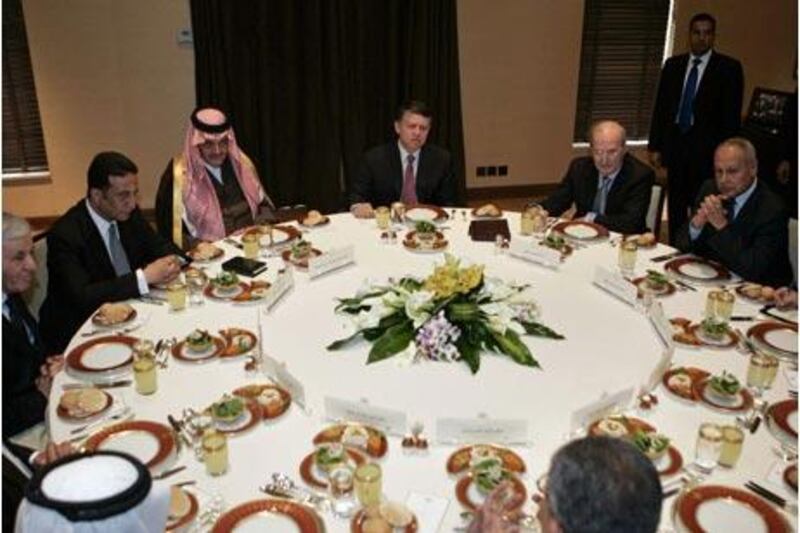AMMAN// Jordanian politicians are hoping that King Abdullah's visit to Washington on Tuesday will help convince US President Barack Obama that Israel, not Arab countries, is the major obstacle to the peace process. King Abdullah, who will be the first Arab head of state to hold talks with Mr Obama since he became president in January, wants the US to play a more active role in implementing a two-state solution.
Amman has been encouraged by statements from Washington regarding its commitment to Middle East peace, but remains deeply concerned that the two-state solution will be ignored by the newly elected, right-wing Likud government of Benjamin Netanyahu. "We have no alternatives, we have to keep pushing and pushing for the [solution], there are glimpses of hope from the Obama administration, but there are frustrating signs from the Israeli government," Fayez Tarawneh, a senator and a former prime minister, said.
"The objective is to orient Obama and to tell him that there is a unified Arab position ? to show the US, its public opinion, the West and even the quartet that Israel is the obstacle to peace and not the Arab world. "There needs to be more pressure on the other side rather than on the Arab side," he added. On Saturday six Arab foreign ministers met with King Abdullah to discuss their support for a solution to end the Israeli-Palestinian conflict envisioning a viable Palestinian state living side by side with Israel.
They also expressed their hope for resuscitating an Arab peace initiative first launched at the Beirut Summit in 2002 that offered Israel normalised ties in return for withdrawal from occupied Arab lands. But without US involvement, such efforts are not likely to yield much progress. "We basically feel that it is time the parties become engaged in serious negotiations leading to a two-state solution with direct US engagement, rather than engage in an open-ended process," Ayman Safadi, an adviser to King Abdullah said. "All the gestures and the statements that have come from Obama and his administration have been very encouraging."
But Jordanian political analysts say that while the country is counting on its close ties with the US, more than just words are needed from the Obama administration. "We are hearing the same statements Bush said before on the Arab-Israeli conflict, but with a different tone from Obama, who is more optimistic and passionate," said Adnan Hayajneh, a professor of political science at Hashemite University in Zarqa, about 25km north-east of Amman.
"We haven't heard anything about implementation. I think the peace process is not on the top of the Obama administration's priority. We want him to pressure Israel, recognise the Arab initiative and move forward with the peace process." The rejection of the Annapolis process by Avigdor Lieberman, Israel's foreign minister, and his statements that Israel is not bound by the road map, which called for the Palestinians to rein in militants before negotiations begin on a final-status agreement, has watered down hopes of any progress on peace with the Palestinians.
"Now that the Likud is in power Jordan is genuinely concerned that Israel has several objectives; no Palestinian state, no serious negotiations with the Palestinians and that Israel will revive the alternative homeland scenario, that Jordan is Palestine," said Mouin Rabbani, a contributing editor to the Middle East Report website. "With [the] weakness and disintegration on the Palestinian side, coupled with Netanyahu in power and Leiberman, there is genuine fear that it is going to spill over into Jordan, not in the sense of Hamas-Fatah clashes in the streets, but into a kind of creeping voluntary transfer," Mr Rabbani said. "Ultimately, this is really all about Jordan and its national interest and national security."
smaayeh@thenational.ae






